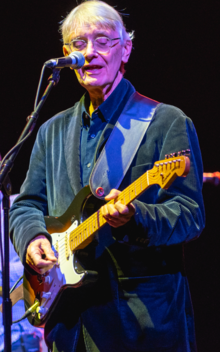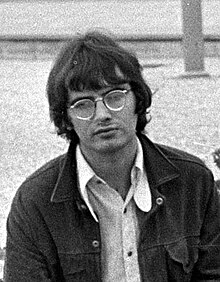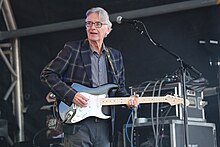Tom McGuinness (musician)
Tom McGuinness | |
|---|---|
 McGuinness in 2021 | |
| Background information | |
| Birth name | Thomas John Patrick McGuinness |
| Born | 2 December 1941 Wimbledon, England, U.K. |
| Genres | Rock, pop, blues |
| Occupation | Musician |
| Instrument(s) | Guitar, bass, vocals |
| Years active | 1960s-present |
| Member of | The Manfreds |
| Formerly of | |
Thomas John Patrick McGuinness (born 2 December 1941) is a guitarist, singer and songwriter who played guitar and bass with rock band Manfred Mann, among others, before becoming a record and television producer.
Early life
[edit]McGuinness was born in Wimbledon, South London in 1941, studied at Wimbledon College and has Irish ancestry.[1] One of his first bands, The Roosters, included an 18-year old Eric Clapton on lead guitar.[1]
Career
[edit]Manfred Mann
[edit]Following a stint in the short-lived Roosters with Eric Clapton, McGuinness joined the 1960s group Manfred Mann as a bassist, performing in a line-up with Paul Jones. As the band sought to transform itself from jazz into a rhythm-and-blues-orientated group, he took over bass duties from Dave Richmond and received joint songwriting credits on the group's early hits. Explaining how he came into the group, McGuinness said, "They had a great bass guitarist, but he was into Charles Mingus and things like that, which the whole band was. But he refused to play simple bass lines that would fit Bo Diddley numbers. He'd play incredible 3/4 lines and things like that. So I came in and I had the overwhelming advantage of not really being able to play the bass guitar, so I played simple."[2] Appointed the writer of album sleeve notes, he took the opportunity to identify himself as "the nastiest in the group".[3]

When Mike Vickers and then Paul Jones left the band, McGuinness took over the guitarist role; Jack Bruce then played bass until replaced by Klaus Voormann. McGuinness' National Steel guitar became an important part of the group's sound, and featured on hits such as "Pretty Flamingo". He composed a few album tracks for the group, notably "L.S.D." (from Mann Made), "One Way", and "Cubist Town" (from Mighty Garvey!).
In total, the band had a successful run in the 60s pop music scene. Three of their most successful singles, "Do Wah Diddy Diddy", "Pretty Flamingo", and "Mighty Quinn", topped the UK charts.[4] They were also the first southern-England-based group to top the US Billboard Hot 100 during the British Invasion.[4]
McGuinness Flint
[edit]After Manfred Mann disbanded in 1969, he formed McGuinness Flint with Hughie Flint, which disbanded in 1975.
Their first single "When I'm Dead and Gone" reached No. 2 on the UK Singles Chart at the end of 1970 (losing the number one spot to Clive Dunn's Grandad), No. 47 on the Billboard pop chart and No.3 5 on the Cashbox pop chart in the U.S., No. 5 in Ireland, and No. 31 in Canada.[5][6]) The debut album McGuinness Flint also made the Top 10 of the UK Albums Chart.[7] In 1999, it received another outing, in the soundtrack of the film, East is East. A follow-up single, "Malt and Barley Blues", was a UK No. 5 hit in 1971 and peaked at No.15 in Ireland.[7][8]
The Blues Band and The Manfreds
[edit]In 1979, four years after McGuinness Flint split up, both founded The Blues Band. Also including Paul Jones, it went on hiatus in 1983, shortly after recording a live album, and regrouped in 1986. It played its last performance in 2022, soon after releasing the last studio album "So Long".[9]

In 1991, McGuinness turned 50. To celebrate his birthday and to announce the release of a Manfred Mann compilation album, all original members (minus Manfred Mann) planned a reunion tour.[10] Mann was still touring with Manfred Mann's Earth Band, was unable to tour with them, so they went with "The Manfreds" instead.[11] With the original members came Mike d'Abo (who replaced Jones after he went solo), Benny Gallagher (of Gallagher and Lyle) and Rob Townsend (of Family).[12]
Discography
[edit]Manfred Mann
McGuinness Flint
(See full discography at McGuinness Flint)
- "When I'm Dead and Gone" (1970)
- "Lay Down Your Weary Tune" (1972)
The Blues
(See full discography at The Blues Band)
The Manfreds albums
[edit]| Album | Year |
|---|---|
| 5-4-3-2-1 | 1998 |
| Live | 1999 |
| Maximum Manfreds | 2000 |
| Uncovered | 2003 |
| Let ‘em Roll | 2014 |
| Makin' Tracks | 2016 |
See also
[edit]References
[edit]- ^ a b "Tom McGuinness | www.TheBluesBand.com". www.thebluesband.net. Retrieved 12 May 2024.
- ^ Holloway, Danny (28 August 1971). "An Old Mann Remembers...". Sounds. Spotlight Publications. p. 11.
- ^ Mann Made (HMV 1911). Sleeve notes
- ^ a b Roberts, David (2006). British Hit Singles & Albums (19th ed.). London: Guinness World Records Ltd. pp. 345–346. ISBN 1-904994-10-5.
- ^ [1] [dead link]
- ^ McGuiness Flint USA chart history Archived 25 November 2015 at the Wayback Machine, Billboard.com. Retrieved 5 May 2013.
- ^ a b Roberts, David (2006). British Hit Singles & Albums (19th ed.). London: Guinness World Records Limited. p. 339. ISBN 1-904994-10-5.
- ^ "The Irish Charts - All there is to know". www.irishcharts.ie. Retrieved 8 June 2023.
- ^ "The Blues Band to release last album 'So Long' and tour dates". Music-News.com. Retrieved 12 May 2024.
- ^ "The Manfreds Songs, Albums, Reviews, Bio & Mor..." AllMusic. Retrieved 12 May 2024.
- ^ Larkin, Colin (2011) The Encyclopedia of Popular Music 5th edn., Bish Bash Books, ISBN 978-1846098567
- ^ "INTERVIEW: The Man Behind the Manfreds". Daily Echo. 21 August 2013. Retrieved 12 May 2024.
External links
[edit]- 1941 births
- Living people
- English male songwriters
- English rock guitarists
- English rock bass guitarists
- Male bass guitarists
- English record producers
- English television producers
- Musicians from Wimbledon, London
- English people of Irish descent
- Manfred Mann members
- British rhythm and blues boom musicians
- Alumni of Wimbledon College of Arts
- English blues guitarists
- The Manfreds members
- The Blues Band members
- McGuinness Flint members
